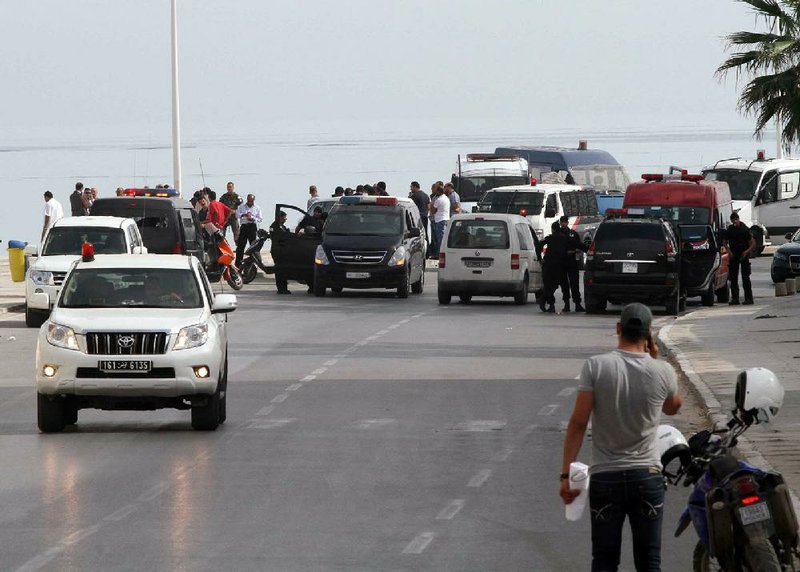TUNIS, Tunisia - A suicide bomber and a teenager carrying a backpack loaded with explosives attacked two sites popular with tourists in Tunisia on Wednesday, officials said.
No one other than the suicide bomber was killed, but the Ministry of Interior said both men belonged to the same extremist group, raising concern that the attacks could signal the adoption of more deadly tactics by Tunisia’s Islamist extremists.
The extremists have experienced a resurgence since Tunisia kicked off the Arab Spring in 2011 by overthrowing its secular dictatorship.
In the suicide bombing, hotel security guards stopped the suspect from entering the Riadh Palm hotel in Sousse, a city 90 miles south of the capital, Tunis, then chased him to a beach where he blew himself up, the Interior Ministry said.
The ministry described the bomber as dark-skinned and wearing an explosive belt. The city is being searched for possible accomplices, said ministry spokesman Mohammed Ali Aroui.
In a foiled attack in nearby Monastir, an 18-year-old followed a group of tourists into the mausoleum of modern Tunisia’s founder, Habib Bourguiba, carrying a backpack full of TNT. He attempted to distract security officials by tossing a firework but was subdued, said Hicham Gharbi, a spokesman for the presidential guard, which patrols the site.
“He will be questioned to learn his motives and those who ordered the attack,” Gharbi said. Bourguiba, Tunisia’s first post-independence president, was a fierce secularist and has long been criticized by hardline Islamists.
Riccardo Fabiani, the North Africa analyst for the Eurasia Group said that coupled with a failed car bomb a few days ago, Wednesday’s attacks suggest the start of a new terrorist campaign targeting civilians and tourism.
“A few episodes alone don’t necessarily make compelling evidence, but three episodes of this kind point in this direction,” he said. “It was also inevitable to an extent that this would happen sooner or later, if you consider the news over the past few months.”
His analysis was echoed by Mokhtar Ben Nasr, the former spokesman for the military, who said the attacks were designed to harm the tourist industry and distract security forces from their efforts to root out militants based in the hinterlands.
Tunisian dictator Zine El Abidine Ben Ali ruthlessly suppressed overt expressions of religion. Since his ouster in 2011, there has been a resurgence of political Islam, including moderates who won elections and hardliners known as salafis.
The salafis were tolerated by the new government led by the moderate Islamist Ennahda Party. But that changed when they began challenging policies they deemed insufficiently Islamic, resulting in increased confrontations between them over the past year.
That culminated in the main salafi group, Ansar al-Shariah, being classified as a terrorist movement in September.
Previously, al-Qaida and other organizations had classified Tunisia as place to carry out preaching, not attacks.
“There was a shift in rhetoric by many of these extremist salafi preachers over the last few months, especially with their disappointment with the experiences of Ennahda in government,” said Fabiani.
Earlier this year, two leftist politicians were gunned down in Tunisia outside their homes, and security forces have repeatedly clashed with militants in several remote areas around the country, many of them armed with weapons spilling over from neighboring Libya.
Compared with those remote sites, the choice of Sousse, a major destination for European tourists, for Wednesday’s attack indicates an effort to strike one of the mainstays of the economy.
Tunisia’s revolution devastated its tourism industry, and this year officials were expecting tourist arrivals to return to the 7 million record set in 2010. More than 5 million tourists had gone to Tunisia by September, according to the Tourism Ministry.
Its spokesman, Zoubeir Jbabli, said there had been no cancellations by tourists and steps were being taken to limit the effect of the Sousse attack.
“We are in contact with the tour operators and families of the tourists to reassure them that the situation is under control and all security measures have been taken to ensure the protection of guests in Tunisia,” he said.
There were some 800 guests at the Riadh Palm hotel when the bomb exploded outside the building, causing some panic, said hotel director Makram Haloul.
“Once we overcame the shock of the morning, we put together a special buffet for the residents and a performance designed to lighten the mood,” he said.
Front Section, Pages 2 on 10/31/2013
